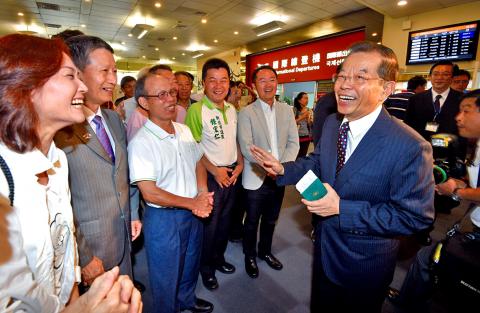Former premier Frank Hsieh (謝長廷) yesterday said he would carry out President Tsai Ing-wen’s (蔡英文) directive of deepening ties with Japan, as he left for Tokyo to report for his new post as the nation’s representative to Tokyo.
Hsieh arrived at Taipei International Airport (Songshan airport) yesterday morning in the company of dozens of friends and colleagues, including Executive Yuan spokesman Tung Chen-yuan (童振源), as well as Democratic Progressive Party (DPP) legislators Kuan Bi-ling (管碧玲) and Pasuya Yao (姚文智), who were there to see him off.
Asked what Tsai’s expectations of him are, Hsieh said the president instructed him to take good care of the relationship between Taiwan and Japan, as the two nations have enjoyed historically close ties.

Photo: Lo Pei-der, Taipei Times
“Due to disaster relief and rescue missions in the past few years, [our bilateral ties] have seen a benign cycle, where we rush to the rescue of Japanese when there is a disaster in their country and vice versa,” Hsieh said.
Taipei and Tokyo have created an excellent mutual-assistance model that ought to be spread to the entire world, Hsieh said, adding that Tsai wants him to further deepen and strengthen the two nations’ bilateral ties based on an already solid foundation.
Hsieh, who served as premier under former president Chen Shui-bian’s (陳水扁) administration from 2005 to 2006, is the first former premier to serve as the nation’s representative to Japan.
Hsieh has a bachelor’s degree in law from National Taiwan University and a master’s degree in legal philosophy from Kyoto University in Japan. He went on to pursue a doctoral degree in the same field at Kyoto University, but only managed to finish all the course work when he decided to return to Taiwan after his father was diagnosed with liver cancer.
Hsieh also served as DPP chairman and Kaohsiung mayor for two terms.
Taipei-Tokyo ties have been strained after the Japan Coast Guard’s seizure of a Taiwanese fishing boat, the Tung Sheng Chi No. 16, on April 25 while operating in waters about 150 nautical miles (228km) from the Okinotori atoll, which Tokyo regards as an island, claiming a 200-nautical-mile exclusive economic zone around it.
Hsieh said that after handing in his credentials to Tokyo, he is due to fly to Japan’s Kumamoto Prefecture today to meet with Kaohsiung Mayor Chen Chu (陳菊) and Tainan Mayor William Lai (賴清德).
Chen and Lai are to leave for Kumamoto today to donate money they have raised for relief efforts in the prefecture, which was struck by a magnitude 7.3 earthquake in April, and to reactivate exchanges between the two sides that have been put on hold due to the temblor.

DAREDEVIL: Honnold said it had always been a dream of his to climb Taipei 101, while a Netflix producer said the skyscraper was ‘a real icon of this country’ US climber Alex Honnold yesterday took on Taiwan’s tallest building, becoming the first person to scale Taipei 101 without a rope, harness or safety net. Hundreds of spectators gathered at the base of the 101-story skyscraper to watch Honnold, 40, embark on his daredevil feat, which was also broadcast live on Netflix. Dressed in a red T-shirt and yellow custom-made climbing shoes, Honnold swiftly moved up the southeast face of the glass and steel building. At one point, he stepped onto a platform midway up to wave down at fans and onlookers who were taking photos. People watching from inside

A Vietnamese migrant worker yesterday won NT$12 million (US$379,627) on a Lunar New Year scratch card in Kaohsiung as part of Taiwan Lottery Co’s (台灣彩券) “NT$12 Million Grand Fortune” (1200萬大吉利) game. The man was the first top-prize winner of the new game launched on Jan. 6 to mark the Lunar New Year. Three Vietnamese migrant workers visited a Taiwan Lottery shop on Xinyue Street in Kaohsiung’s Gangshan District (崗山), a store representative said. The player bought multiple tickets and, after winning nothing, held the final lottery ticket in one hand and rubbed the store’s statue of the Maitreya Buddha’s belly with the other,

‘NATO-PLUS’: ‘Our strategic partners in the Indo-Pacific are facing increasing aggression by the Chinese Communist Party,’ US Representative Rob Wittman said The US House of Representatives on Monday released its version of the Consolidated Appropriations Act, which includes US$1.15 billion to support security cooperation with Taiwan. The omnibus act, covering US$1.2 trillion of spending, allocates US$1 billion for the Taiwan Security Cooperation Initiative, as well as US$150 million for the replacement of defense articles and reimbursement of defense services provided to Taiwan. The fund allocations were based on the US National Defense Authorization Act for fiscal 2026 that was passed by the US Congress last month and authorized up to US$1 billion to the US Defense Security Cooperation Agency in support of the

HIGH-TECH DEAL: Chipmakers that expand in the US would be able to import up to 2.5 times their new capacity with no extra tariffs during an approved construction period Taiwan aims to build a “democratic” high-tech supply chain with the US and form a strategic artificial intelligence (AI) partnership under the new tariffs deal it sealed with Washington last week, Taipei’s top negotiator in the talks said yesterday. US President Donald Trump has pushed Taiwan, a major producer of semiconductors which runs a large trade surplus with the US, to invest more in the US, specifically in chips that power AI. Under the terms of the long-negotiated deal, chipmakers such as Taiwan Semiconductor Manufacturing Co (TSMC, 台積電) that expand US production would incur a lower tariff on semiconductors or related manufacturing